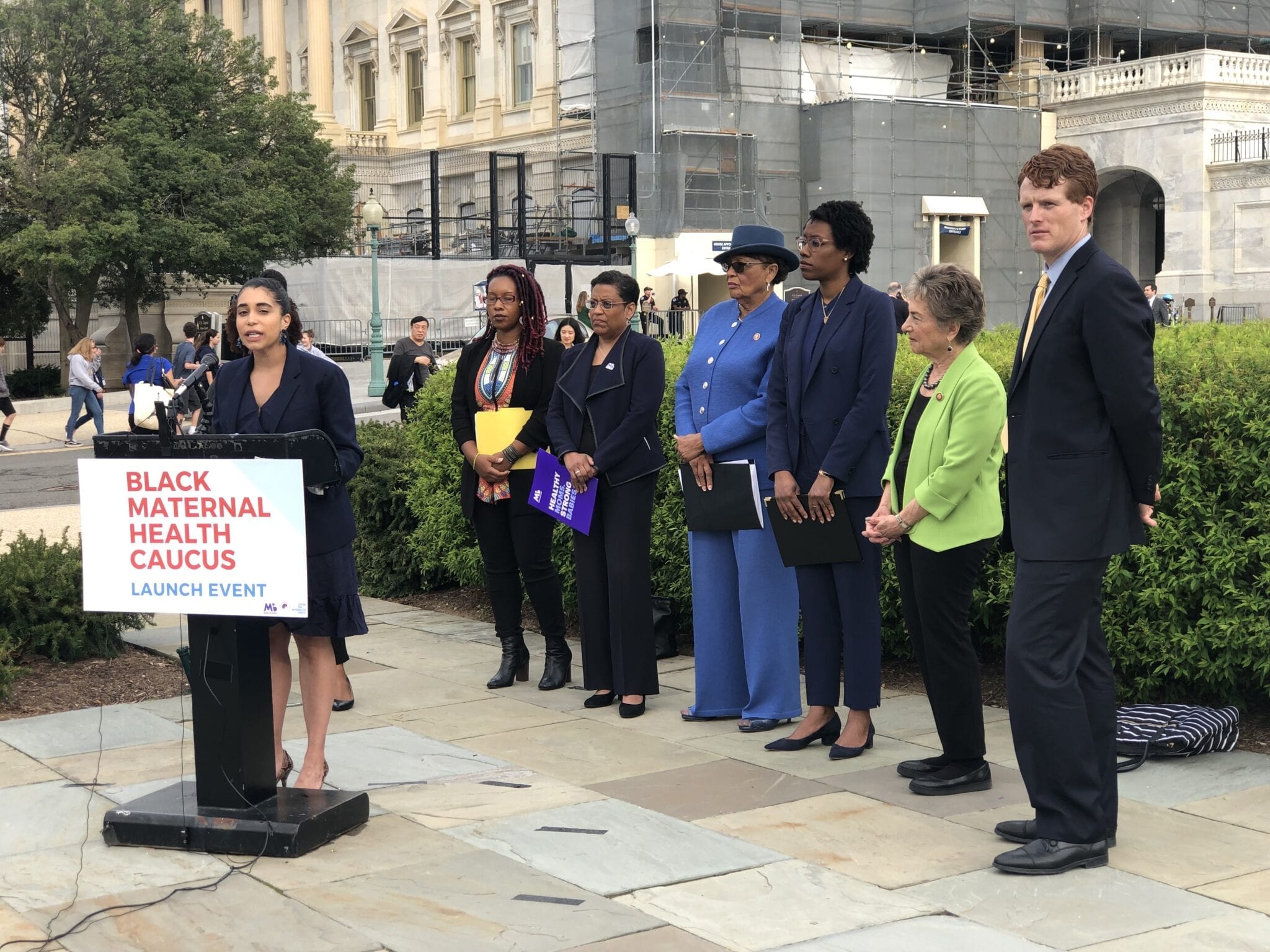Center Spotlight: Jennifer Jacoby Talks U.S. Maternal Health
Reducing dangerous and preventable racial disparities in U.S. maternal health outcomes is her job; it’s also personal.

Jennifer Jacoby is well-versed in racial bias in the U.S. maternal health care system and the unconscionably poor health outcomes that result from that bias.
Guiding her each day, she says, are some stark and irrefutable statistics: The U.S. has the highest rate of maternal mortality and morbidity among the world’s wealthy nations, and Black and Indigenous women are nearly four times more likely than white women to experience life-threatening complications or to die from complications of pregnancy—even when controlling for other socio-demographic factors such as health status or neighborhood income.

Based in Washington, D.C., Jacoby, federal policy counsel at the Center for Reproductive Rights, works closely with members of Congress and their staffs and with human rights colleagues at the Center to generate and advocate for bills to end racial disparities in maternal health. She also works with federal agencies to advance progressive maternal health policy. Toward that goal, she collaborates with partner organizations, including, but not limited to, Black Mamas Matter Alliance, the Century Foundation, the Center for American Progress, National Birth Equity Collaborative, Ancient Song Doula Services, and Changing Woman Initiative.
This fall, Jacoby spoke as an expert witness in a hearing on racial disparities in maternal health before the U.S. Commission on Civil Rights. Her testimony combined her professional work and her lived experience: “Pregnant and birthing people have the right to safe and respectful maternal health care, free from discrimination, coercion, and violence,” she said. “But the U.S. has failed to meet its obligations to protect, respect, and fulfill those rights.”
It was her own mother’s experience in pregnancy more than three decades ago that helped propel Jacoby’s decision to leave a corporate law firm and to join the Center in 2018.
As she explained at the hearing, her mother nearly lost her life when symptoms of preeclampsia during her pregnancy with Jennie went undiagnosed. Preeclampsia is a serious complication of pregnancy that usually begins after 20 weeks and is characterized by high blood pressure and signs of damage to other organ systems, most often the liver and kidneys.
Jacoby certainly never imagined that she would experience the same “harrowing” experience and complication during her own pregnancy with her daughter, who is now two years old. Jacoby grew up in New York City, the self-described daughter of “a Black mother and a white, Jewish father.”
There is no doubt in her mind that in both situations, three decades apart, race was a factor in how she and her mother were each treated as their preeclampsia went undiagnosed. “We advocated for ourselves, had access to top doctors, good insurance, and sufficient means. But our circumstances were no match for racial bias,” Jacoby said.
She said of her experience: “I bore my mother’s symptoms, which also went undetected. I was told to go home. I fought to be admitted to the hospital early. I was blamed for my condition. I had a caesarean section that most likely could have been prevented. For days, my mother watched helplessly by my side as history repeated itself.”
Jacoby is a powerful witness, said Breana Lipscomb, a senior manager for the Center’s Maternal Health and Rights Initiative who works closely with her on maternal health issues. “Jennie’s transparency in sharing her own experience of being on the receiving end of racial bias in the health care system not only fuels her passion for this issue, but presents a firsthand story that members of Congress cannot ignore,” Lipscomb said. “She has been steadfast in her quest to protect the health and rights of birthing people.”
Along with advocating for a congressional resolution on Black maternal health, Jacoby helped launch the Black Maternal Health Caucus, which in March 2020 introduced its Black Maternal Health Momnibus Act of 2020 with now Vice President-Elect Kamala Harris as lead Senate sponsor. The set of nine bills, which the Center worked on, addresses maternal health issues faced by people of color, veterans, Indigenous people, incarcerated women, and others impacted by failings of the maternal health system. This past summer, Jacoby gave the concluding remarks at the second annual Black Maternal Health Caucus stakeholder summit.
The Indigenous community has become another focus for Jacoby. She works with the Center’s human rights, state, litigation, and Lawyers Network teams and with Indigenous advocates toward building a comprehensive federal strategy to address poor maternal health outcomes in that community. In partnership with Congresswoman and newly named Interior Secretary nominee Deb Haaland of New Mexico, she helped hold a historic congressional briefing on Indigenous maternal health and supported the introduction of a Native maternal health resolution in Congress.
“What’s so powerful about the Center’s work, not just in the federal space but in states and in the United Nations,” Jacoby says, “is that we’re trying to hold the government and health care systems accountable for these racial disparities because it is a human rights violation. We’ve treated this like a public health crisis, and it is. But people’s rights are being violated.” Jacoby, Lipscomb, and her colleagues at the Center will not stop until access to safe and respectful maternal health care is a reality for all.
We invite you to watch Jennifer Jacoby’s expert testimony before the November 13 “Racial Disparities in Maternal Health” briefing at the U.S. Commission on Civil Rights here.
The Center’s full written testimony to the U.S. Commission on Civil Rights is available on the Commission’s website.
Read more about the Center’s efforts to fight racial disparities in maternal health in the U.S. and improve health outcomes worldwide.

